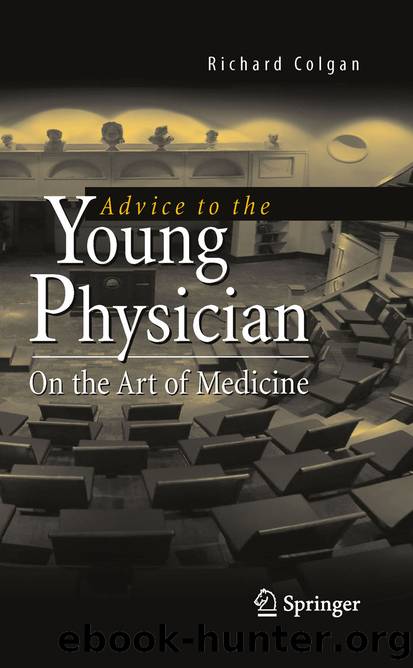Advice to the Young Physician by Richard Colgan

Author:Richard Colgan
Language: eng
Format: epub
Publisher: Springer US, Boston, MA
Outwardly, the virtuous physician acting as an appropriate moral agent will exhibit behaviors characterized by fidelity to trust and promise, benevolence, effacement of self-interest, compassion and caring, intellectual honesty, justice, and prudence. Pellegrino also indicates that the virtuous physician is one who is consistent, and acts morally both at work and at home, both in professional and personal arenas, with colleagues and patients as well as family and friends. The physicianâs behaviors are not just seen while he or she is practicing medicine, but in all of their actions in all sections of life. Unfortunately discrepancies occur and may negatively affect one realm as expense for maintaining another. An example of such a discrepancy is the physician who is âmarriedâ to his or her work and doesnât have time for his spouse or children. A key condition of being virtuous is balancing conflicting obligations judiciously. The virtuous physician is one who acts with the âright reason,â which Aristotle and Aquinas considered essential [7]. He or she realizes that they may easily be pulled in many directions by all different facets of life, but through thoughtful judgment is able to balance these opposing forces in order to achieve success in all areas. Clearly, in order to be a great healer, one must also strive to be a virtuous healer.
When I asked which of his many scholarly publications he considered most effective in communicating the importance of the physicianâpatient relationship to the young healer, who strives to be the best he or she can be with regard to the art of medicine, Dr. Pellegrino quickly cited A Philosophical Reconstruction of Medical Morality and the Caring Ethic [9].
In his publication, Pellegrino first describes how there exists a philosophical foundation for the obligations which bind those who profess to practice medicine, âbetter still, all who profess to heal [9].â He notes that today fewer physicians follow a religious foundation of ethics or remain faithful to the Hippocratic Oath. Pellegrino proposes a philosophy of the physicianâpatient relationship beginning with the tenet that the physician is in all aspects of life a good man or woman. Second, he explains that the nature of medicine itself is a professionâa vocationâbased on healing; further, that this raises certain expectations and implies particular requirements on the part of the physician. In this essay, Pellegrino discusses Scribonius Largus, who practiced as either a physician or pharmacistâwe do not know whichâin the time of the Emperor Claudius. He was one of the first to refer to medicine as a vocation in the first century ACE [2]. Scribonius opined that physicians should choose to play the role required of their profession and strive to achieve the expectations implied by their position. Commiseration and humaneness are cited as unique virtues to our profession, just as truth is to a judge.
The third source of a professional basis of ethics is the physicianâpatient relationship itself. Throughout medical history, physicians evolved from serving as craftsman in the time of the early Greeks to being members of an elite group in society from whom patients sought care.
Download
This site does not store any files on its server. We only index and link to content provided by other sites. Please contact the content providers to delete copyright contents if any and email us, we'll remove relevant links or contents immediately.
So Young, So Sad, So Listen: A Parents' Guide to Depression in Children and Young People by Philip Graham Nick Midgley(565)
Vital Signs by Izzy Lomax-Sawyers(466)
Wilderness and Survival Medicine by Ellis Chris Breen & Dr Craig(321)
Eating and Growth Disorders in Infants and Children by Joseph L. Woolston(314)
Case Studies in Adult Intensive Care Medicine by Daniele Bryden(311)
Boxed Set 1 Dermatology by Dr Miriam Kinai(288)
Manufacturing Social Distress by Robert W. Rieber(270)
Data Analysis in Sport by O'Donoghue Peter Holmes Lucy(253)
Vision and Perception by Howard Burton(235)
Yoga by Seber Isaiah(232)
Neuroradiology - Expect the Unexpected by Martina Špero & Hrvoje Vavro(227)
A History of Neuropsychology by J.Bogousslavsky & F. Boller & M.Iwata(223)
Complications in Vascular and Endovascular Surgery by Earnshaw Jonothan J;Wyatt Michael G;(215)
Basic and Advanced Laboratory Techniques in Histopathology and Cytology by Pranab Dey(214)
Qigong Massage for Your Child with Autism by Anita Cignolini(212)
Manufacturing social distress : psychopathy in everyday life by Robert W. Rieber(212)
The Psychology of Enhancing Human Performance by Gardner Frank L.;Moore Zella E.;(204)
A Patient's Guide to Cataract Surgery: Normal and LASIK Reshaped Cornea by Unknown(201)
The Liferaft Survival Guide by Howorth Michael;Howorth Frances;(199)
